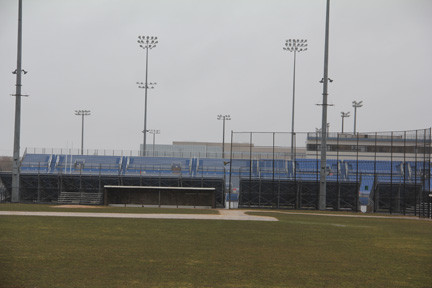Molloy field deal moves forward
Committee approves deal, OKs college’s $1.3 million investment
Just two weeks after it had voted to delay the arrangement, the Rules Committee of the Nassau County Legislature voted on March 18 to allow the agreement between the county and Molloy College to rent space at Mitchel Field as well as invest $1.3 million to renovate the complex.
The agreement would allow Molloy to have use of the baseball field at a reduced rate and would give the college first access to it during the softball season from 2 to 6 p.m. during the week and from 9 a.m. to 1 p.m. on Saturdays for games, all of which would be done by permit. Molloy would pay $20 per hour instead of $40 for the use of the baseball field. If it rented any field other space, the rates would be the same as for everyone else.
“This is another great public-private partnership that improves a public facility at no cost to taxpayers while providing increased access for Nassau County residents,” said County Executive Edward Mangano. “It’s a win-win for the community.”
Under the agreement, Molloy would have its access to the field for 20 years, with the option to extend it for another 10. The county said that plans for the field are being developed, but it would not speculate on when work would begin.
“We were pleased to have Nassau County legislators approve this, and we look forward to seeing this great example of public-private partnerships come to fruition,” said Edward Thompson, Molloy’s vice president for advancement, in a statement to the Herald.
The agreement was initially blocked by the Democratic members of the Rules committee, who felt that the agreement amounted to a lease of county park land, which would have to be approved by the full legislative body as well as New York State.
“New York State Court decisions make it absolutely clear that even a so-called permit that provides exclusive use is an alienation of park land that requires state legislative approval,” Legislator Dave Dennenberg (D-Merrick), who is not a member of the Rules Committee, said in a release two weeks ago. “This 30-year agreement to provide exclusive use of a ball park at Mitchel Field is the same as a lease and therefore an illegal alienation of parkland.”
Legislator Howard Kopel (R-Lawrence), the vice-chair of the Rules Committee, was one of four Republican legislators who voted in favor of the deal.
“I think everybody just really wanted to be sure we were doing the right thing legally: whether it was going to be a license or a lease,” Kopel said, explaining the reason for the delay two weeks ago. “I think that was the main issue.”
According to Kopel, the license is terminable by the county with 30 days notice. “If it’s not working out, you give [Molloy] back some money and they give [the field time] back,” Kopel said. “So if they’re abusive and everyone isn’t getting access in the way that it was anticipated everyone would, then that’s it.”
Wayne Wink (D-Roslyn) was the sole opposition to the measure (the other Democratic legislators abstained). He explained that he wasn’t opposed to the public-private partnership itself, but the process by which it was presented. Nassau Community College is unclear how this will affect its ability to use Mitchel Field.
“When the president of the Board of Trustees of Nassau Community College, a number of students and professors all came up and said, ‘We need more information. Please don’t move forward with this,’ it seemed incumbent upon us to either table the item or kill the item and start over again,” Wink said. “It was a matter that the process was so faulty, in my opinion, that I thought it was important to vote no.”
Kopel said he supported the measure because, even though the county was giving up some field time to Molloy, the benefits far outweighed the cost.
“Is it better to devote some time to a specific organization — which could always get it anyway by reserving space — and get in return a first-class facility, or is it better to have it open to everybody and have a facility that isn’t working?” said Kopel. “It’s kind of a freebie. So I understand the reactions against it, but it really wasn’t alienation of parkland.”

 48.0°,
Overcast
48.0°,
Overcast 




